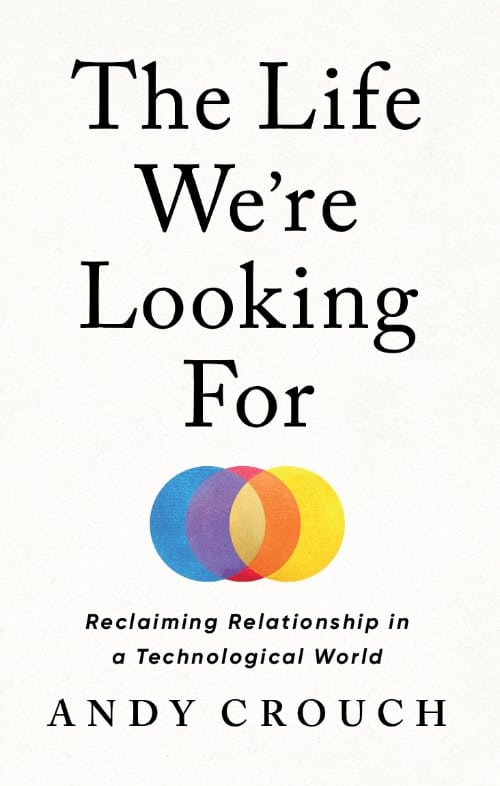The Life We’re Looking For

Something’s wrong.
We’re powerful. We’re technologically advanced. By most standards, we’re rich. We can get almost anything we want delivered to our door in hours.
And yet loneliness is rampant. The happiness we were promised seems elusive, always out of grasp, perhaps even farther away than before.

The problem, according to Andy Crouch in his new book The Life We’re Looking For, is that the promises of the modern technological world are built on “a false understanding of what human beings really are and what we most need.”
The blessings of the modern world are real, but what we’re looking for most is what we sought in our first minutes on earth, and what we’ll search for in our last: a face that gazes back at us. What we need is to reclaim relationships and the importance of personhood.
What’s Wrong?
Crouch is skilled at understanding what’s behind the modern world and its promises. We’re usually good at recognizing overt evil. We don’t seem to be as good at recognizing the hidden assumptions of the culture we live in: the promise of effortless power through technology, systems that promise to serve us but exploit us instead, and intelligent machines that still fall short of the dignity and power of a human baby. We live in a dehumanizing world.
Crouch doesn’t only critique. He points to a better way: to choices that engage our full selves, reclaim our personhood, and form us through relationships.
Crouch doesn’t offer easy answers or a quick fix. Instead, he helps us discover something we already know how to do but may be tempted to abandon because of the promises of the modern world.
What to Do
Reading this book both warned and encouraged me. It made me rethink assumptions I’ve uncritically adopted. It also encouraged me in my work as a pastor of a small church in a major city, full of the promises of advancement and progress. What our little church offers really does matter.
What we need most is not 10x growth, new visions and strategies to produce impact, or technologies that will leverage our influence. We need small groups of people who are committed to each other, where people are seen less as instruments but as people to be loved. We need less focus on lives that are less charmed (with no suffering) and more blessed (experiencing an abundance of grace in the middle of suffering).
“The first urban Christians … had no charms to offer, but they did have — and they sacrificially offered — personal community and personal love.” We can offer the same today.
The Life We’re Looking For is a book that’s worth reading a couple of times and discussing with others. It’s insightful, helpful, and encouraging.
Crouch mentions that we’re longing for recognition: a face that gazes back at us. He reminds us: we have received that, and we have the power to offer it to others too. In our own time, we can restore persons, name the unnamed, care for the vulnerable, and play our part in the restoration of all things.
When we do so, we’ll be “joining the thread of history that matters most — the thread of personal recognition, from one generation to the next, which is the only thing that keeps the life that is really life going in human history.”
Favorite Quotes
“All real change starts with the number of people who can sit around a table in a single household.”
“Of all the creatures on earth, we are by far the most dependent, the most relational, the most social, and the most capable of care. When we love, we are most fully and distinctively ourselves.”
“To be a person is to be made for love. This is both the indelible fact of who we are and the great adventure of each of our lives.”
“God wishes to put all things into the service of persons and ultimately to bring forth the flourishing of creation through the flourishing of persons. Mammon wants to put all persons into the service of things and ultimately to bring about the exploitation of all of creation.”
More from Amazon.com | Praxis






